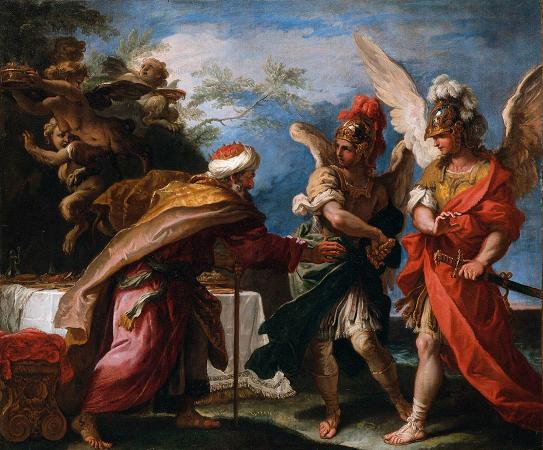Phineus. In Greek mythology, Phineus is a king of Thrace who is punished by the gods for his transgressions. He is often depicted in art as an old, blind man who is tormented by harpies, which are monstrous birds with the faces of women. One of the most famous paintings of Phineus is Phineus and the Harpies by Giovanni Battista Tiepolo. In this work, Phineus is shown seated at a table, with the harpies swooping down to steal his food. The Blinding of Phineus by the Flemish artist Jacob Jordaens depicts the moment when Phineus is blinded by the gods as punishment for his crimes. Phineus and the Argonauts by the French artist Gustave Moreau shows the moment when the hero Jason and his companions, the Argonauts, encounter Phineus and offer to help him rid himself of the harpies. Several different versions of Phineus's parentage were presented in ancient texts. According to Apollonius of Rhodes, he was a son of Agenor, but the Bibliotheca says that other authors named his father as Poseidon. The Hesiodic Catalogue of Women, on the other hand, reported that Phineus was the son of Phoenix and Cassiopeia. His first wife was Cleopatra, daughter of Boreas and Oreithyia, by whom he had a pair of sons, named either Plexippus and Pandion, or Gerymbas and Aspondus, or Polydector and Polydorus, or Parthenius and Crambis, or Oryithus and Crambis. His second wife, Idaea, daughter of the Scythian king Dardanus, deceived him into blinding these sons, a fate Phineus himself would suffer. By his second wife, or by a Scythian concubine, Phineus had two more sons, Mariandynus and Thynus. According to some sources, he also had two daughters, Eraseia and Harpyreia while another daughter Olizone was called the wife of Dardanus, who was the son of Zeus and Electra, and became the mother of Erichthonius. Phineus's own blinding was variously attributed to the outrage against his sons, his giving Phrixus directions on his journey, or because he preferred long life to sight, or, as reported in the Argonautica, for revealing the future to mankind. For this reason he was also tormented by the Harpies, who stole or defiled whatever food he had at hand or, according to the Catalogue of Women, drove Phineus himself to the corners of the world. According to scholia on the Odyssey, when asked by Zeus if he preferred to die or lose sight as punishment for having his sons killed by their stepmother, Phineus chose the latter saying he would rather never see the sun, and consequently it was the scorned Helios who sent the Harpies against him. However the Harpies plagued him, deliverance from this curse motivated Phineus's involvement in the voyage of the Argo. Those accounts in which Phineus is stated to have blinded his sons, add that they had their sight restored to them by the sons of Boreas, or by Asclepius. When the ship landed by his Thracian home, Phineus described his torment to the crew and told them that his brothers-in-law, the wing-footed Boreads, both Argonauts, were fated to deliver him from the Harpies. Zetes demurred, fearing the wrath of the gods should they deliver Phineus from divine punishment, but the old seer assured him that he and his brother Calais would face no retribution.
more...








